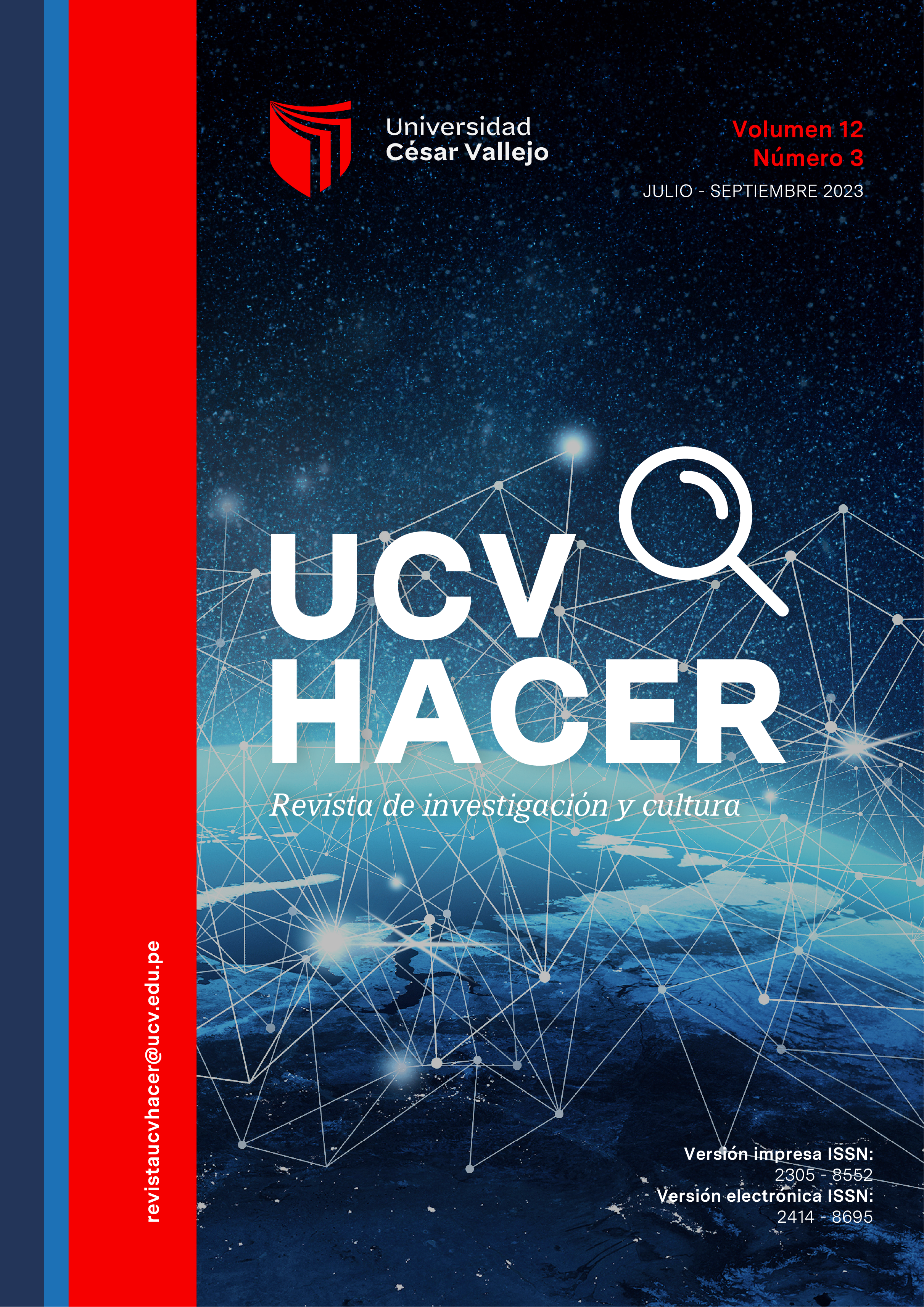The complexity of Technostress and assertiveness in professionals Peru 2023
DOI:
https://doi.org/10.18050/revucvhacer.v12n3a1Keywords:
Technostress, Assertiveness, ICT, ProfessionalsAbstract
he present investigation seeks to determine the relationship between the complexity of Technostress and assertiveness in professionals in Peru -2023, and thus understand how work with the use of technology generates technostress and this can affect the assertive communication of employees, causing interpersonal difficulties, work and family. It was evaluated voluntarily and anonymously; A sample of 92 professionals from different careers ranging from 25 to 60 years of age belonging to the La Libertad and Huancavelica region was taken. The assertiveness test and a questionnaire were used to collect information on techno-stress. The design of this research is quantitative correlational. According to the results, it is established that there is a moderate negative relationship; therefore, the null hypothesis is rejected, accepting the alternate hypothesis. It is concluded that there is a relationship between techno-stress and assertiveness he present investigation seeks to determine the relationship between the complexity of Technostress and assertiveness in professionals in Peru -2023, and thus understand how work with the use of technology generates technostress and this can affect the assertive communication of employees, causing interpersonal difficulties, work and family. It was evaluated voluntarily and anonymously; A sample of 92 professionals from different careers ranging from 25 to 60 years of age belonging to the La Libertad and Huancavelica region was taken. The assertiveness test and a questionnaire were used to collect information on techno-stress. The design of this research is quantitative correlational. According to the results, it is established that there is a moderate negative relationship; therefore, the null hypothesis is rejected, accepting the alternate hypothesis. It is concluded that there is a relationship between techno-stress and assertiveness with a value of “rho” =-0.437 (p=0.000<0.05).
Keywords: Technostress, assertiveness, ICT, professionals
Downloads
References
Ascue, E., Iberico, L. y Torres, A. (2021). Tecnoestrés y satisfacción laboral en trabajadores que realizan teletrabajo en instituciones adventistas. Alicia. https://alicia.concytec.gob.pe/vufind/Record/UEPU_67594cb13976dea8cb26abdbd95ef933
Barradas, M. (2018). Estrés y burnout enfermedades en la vida actual. Palibrio. https://books.google.com.pe/books?id=rOBiDwAAQBAJ&printsec=-frontcover&dq=burnout+y+estres+laboral&hl=es&-sa=X&redir_esc=y#v=onepage&q=burnout%20
y%20estres%20laboral&f=false
Cannizzaro, E., Ramaci, T., Plescia, F. (2019). Work-related stress, pathophysiological mechanisms and influence of environmental genetic factors. Journal IJERPH, 16(20), 1-10 https://doi.org/10.3390/ijerph16204031
Cañas, D. y Hernandez, J. (2019) Comunicación asertiva en profesores: diagnóstico y propuesta educativa. Revista Praxis y Saber, 10(24), 143-165. http://www.scielo.org.co/scielo.php?script=sci_arttext&pid=S2216-01592019000300143
Carrión, N., Castelo, W., Guerrero, J., Crillo, L. y Jaramillo, M. (2022). Factores que influyen en el tecnoestrés docente durante la pandemia por la COVID-19, Ecuador. Revista Información Científica. 101(2), 1-12. http://scielo.sld.cu/scielo.php?script=sci_arttext&pid=s1028-99332022000200006
Coppari, N. (2018). Tecnoestrés, entre lo deifico y lo Demónico: Las TICs y su Impacto en los Jóvenes. Prociencia-CONACYT. https://www.conacyt.gov.py/sites/default/files/upload_editores/u294/TECNOESTRES.pdf
Cuenca, L. M. & Valdez, Y. F. (2022). Tecnoestres en docentes universitarios en tiempo de pandemia. Academic Disclosure, 4(2), 47–64. https://revistascientificas.una.py/index.php/rfenob/article/view/2633
Domínguez, L., Rodríguez, D. Totolhua, B. y Rojas, J. (2021). Tecnoestrés en docentes de educación media superior en el contexto de confinamiento por COVID-19: Un estudio exploratorio. Revista Dilemas contemporáneos: educación, política y valores, 9(1), 1-21. https://www.scielo.org.mx/scielo.php?pid=S2007-78902021000800043&script=sci_arttext
Ferreira, K. (2021). O Stress docente relacionado ao ensino remoto no contexto da pandemia do Covid-19 em Marabá-Pa. https://faced.unifesspa.edu.br/images/TCC/2021/KAUANNA_PETRA.pdf
Golu, F. (2021). Tech Fatigue - A new pandemic. Studia Doctoralia. Psychology and Educational Science. 12(2), 85–87. https://studiadoctoralia.ro/index.php/sdpsych/article/view/129/109
Gómez, M. (2021). La cuarta revolución industrial y su impacto sobre la productividad, el empleo y las relaciones jurídico-Laborales: desafíos tecnológicos del siglo XXI. Aranzadi. https://books.google.com.pe/books?id=kzc0EAAAQBAJ&pg=PT87&dq=-tecnofatiga&hl=es&sa=X&ved=2ahUKEwiMisbliZ39AhUhppUCHaQfB7wQ6AF6BAgBEAI#v=onepage&q&f=false
Machorro, M. (2020). Postmodernidad, tecnología y comunicación humana. Revista Medicina Genética, 31(3), 565-575. https://doi.org/10.36105/mye.2020v31n3.02
Octavio, J. (2020). Comunicación Asertiva: ¡Exprésate sin miedo! 5 consejos para comunicarse. https://books.google.com.pe/books?id=JuJtEAAAQBAJ&pg=PA7&dq=estres+y+asertividad&hl=es&sa=X&-ved=2ahUKEwiKmJG1_Jj9AhWdLrkGHZ54AkA4FBDoAXoECAYQAg#v=onepage&q&f=false
Páez, C. (2020). La influencia de las TIC`s en la sociedad actual. https://entorno-empresarial.com/lainfluencia-de-las-tics-en-la-sociedad-actual/
Pinillos, P. (2021). Tecnoestrés y teletrabajo. RIULL-Repositorio institucional. http://riull.ull.es/xmlui/handle/915/22854
Rodríguez, D., Totolhua,B., Domínguez, L. Rojas, J., De La Rosa, B. (2021). Technostress: A descriptive analysis in university professors during the health contingency due to COVID-19. Acta Académica, 3(2), 225-237. https://www.aacademica.org/dr.jose.luis.rojas.solis/72
Rodriguez, P. y Yepes, Y. (2020). Implicaciones del tecnoestrés en trabajadores: una revisión sistemática [Trabajo de grado para obtención de grado en Psicología, Universidad de Santo Tomás – Bogotá]. https://repository.usta.edu.co/handle/11634/31995
Rodriguez, M. (2020). El Tecnoestrés como factor de riesgo para la seguridad y salud del trabajador. Lan Harremanak, (44), 164-183. https://doi.org/10.1387/lan-harremanak.22239
Sánchez, M., Cebrian, B., Ferre, P., Navarro, M. y Plazuelo, N. (2020). Tecnoestrés y edad: Un estudio transversal en trabajadores públicos. Cuadernos de Neuropsicología, 14(2), 25-33. https://dialnet.unirioja.es/servlet/articulo?codigo=7682392
Shelton, N., Burton, S. (2004). Asertividad. Haga oír su voz sin gritar. FC Editorial.
Vidotti, V., Trevisan, J., Quina, M., Perfeito, R. y Cruz, M. (2019). Síndrome de burnout, estrés laboral y calidad de vida en trabajadores de enfermería. Enfermería global, 18(3), 344- 376. https://dx.doi.org/10.6018/eglobal.18.3.325961
Villavicencio, E., Ibarra, D. G., & Calleja, N. (2020). Tecnoestrés en población mexicana y su relación con variables sociodemográficas y laborales. Psicogente, 23(44), 1–27. https://doi.org/10.17081/psico.23.44.3473
Vincensini, P. (15 de Febrero 2023). Más allá del «¿estás bien?». Salud mental en el trabajo. https://www.ioe-emp.org/es/noticia/detalles/blog-mas-alladel-estas-bien-salud-mental-en-el-trabajo
Yauri, C. (2022). Trabajo remoto y el estrés laboral en educadores de educación primaria - Huarmey, 2022 [Tesis de posgrado, Universidad César Vallejo]. https://repositorio.ucv.edu.pe/handle/20.500.12692/98079
Downloads
Published
How to Cite
Issue
Section
License
Copyright (c) 2023 Jacqueline Roxana Romero Reyna, Guido Flores Marín, Francisco Alejandro Espinoza Polo

This work is licensed under a Creative Commons Attribution 4.0 International License.










